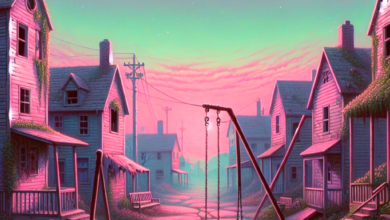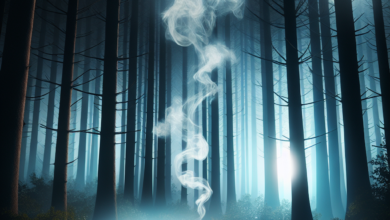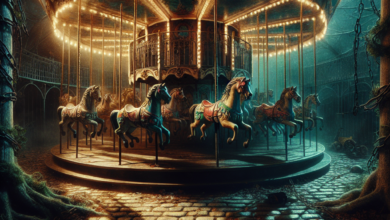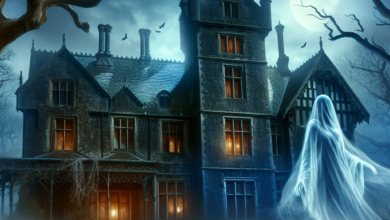The Echoes of Regret
In the quiet town of Elderspring, where time seemed to flow differently, lives were woven into the fabric of its serene landscapes. The houses were painted in pastel hues, standing with the dignity of age, while the trees swayed gently, whispering secrets of the past. It was a place where neighbors exchanged knowing glances, and children played freely, their laughter echoing against the backdrop of distant mountains.
At the heart of Elderspring was a small café called “The Whispering Willow.” Its wooden sign creaked with the wind, and its doors were always open to weary travelers and townsfolk alike. Inside, the aroma of freshly brewed coffee mingled with the scent of baked goods, tempting even the most steadfast dieters. The café was owned by Margaret Finch, a woman in her early sixties with laughter lines etched around her eyes and a warmth that drew people in like moths to a flame.
Margaret had turned to running the café after her husband, Thomas, had passed away five years ago. The two had shared a lifetime of memories—long walks, whispered dreams, and quiet evenings spent in each other’s company. Yet, after his death, the silence in their home echoed with things left unsaid. It was this silence that drove Margaret to become a mother to the community, a role she embraced with love and care.
But not all was well beneath Elderspring’s peaceful facade. For every smile exchanged, there lingered the haunting of past choices—echoes of regret that shaped people’s lives in ways they often dared not acknowledge. Foremost among them was Clara Matthews, a woman who had once been the town’s shining star but had since faded into a shadow of her former self.
Clara was once the girl with the golden curls and a voice that could melt hearts. She had dreams of recording an album, of performing on stages that stretched beyond the town’s borders. But when she was twenty, love had come knocking in the form of David Holloway, a charming young musician with wild dreams of his own. Their romance had bloomed like spring flowers, intoxicating but fleeting, and they married in a flurry of passion.
Life soon took over. Clara found herself wrapped in the comforting monotony of domesticity while David chased the elusive dream of fame. As years passed, their love grew shadowed by bills left unpaid, and dreams left unfulfilled, until the day Clara received the news that David had gone on a tour without her. The letter slipped through her fingers like grains of sand. That was the last she heard from him. He had vanished from her life as suddenly as he had entered it.
That was thirty years ago.
For Clara, every corner of Elderspring carried memories of a life that could have been. The walls of the Whispering Willow bore witness to her heartache, the scent of brewed coffee mingling with her thoughts, each sip a reminder of missed opportunities. With time, she had retreated from the joy of music that once defined her, silencing the echo of her voice that remained like a shadow in her mind.
On an unassuming Thursday morning, the café buzzed with familiar chatter as the townsfolk shared their latest gossip. Margaret noticed Clara seated at her usual table in the far corner, hunched over a cup, the remnants of an unfinished muffin lying forlornly on her plate.
“What will it be today, Clara?” Margaret asked, her tone light but concerned.
Clara looked up, her eyes clouded with shadows of past regrets. “Just the usual, Margie. Black coffee, please.”
Margaret nodded, pouring the coffee as Clara stared out the window, watching the world pass by. The autumn leaves danced to the ground, swirling in the crisp air, and she felt the weight of her own memories constricting around her heart.
One morning, as winter began to wrap its cold fingers around Elderspring, Clara noticed something peculiar—a small flyer posted by the café’s entrance announcing an upcoming event. “Elderspring’s First Open Mic Night,” it read, promising a platform for musicians of all levels. Clara’s heart raced for a moment, a whisper of longing meeting her like an old friend.
“Margaret,” Clara said, half-surprised at the steadiness of her own voice. “Are you really going to host an open mic night?”
“Of course!” Margaret replied, her enthusiasm infectious. “It’ll be fun, and it doesn’t matter if you’re good or not. Just come, share some music, and have a good time!”
“Share music?” Clara echoed, feeling the knot in her stomach tighten. Memories flickered in her mind’s eye: the thrill of performing, the rush of the crowd’s applause, the confidence that came with sharing her soul. Yet, there was also the pain of David leaving; the thought of performing brought a flood of memories that set her heart ablaze and made her feel as if she could drown in it.
Days passed, and the echoes of regret loomed large in Clara’s mind. As the day of the open mic neared, she found herself whispering old lyrics to the mirror, her fingertips poised above the guitar that had sat untouched in her living room for years. She didn’t want to perform, yet it felt like a challenge thrown at her feet, a light flickering at the end of her long, dark corridor.
The night of the event arrived amid excitement that enveloped the café. The Whispering Willow was bright, adorned with fairy lights that danced in rhythm with the laughter of the townsfolk. Margaret had worked tirelessly to transform the café, bringing in a small stage and setting up microphones that glittered under the soft glow.
Clara arrived late, hesitating at the door as the lively atmosphere clashed with her quiet intentions. She watched as local talents took the stage, their voices weaving through the air like notes fluttering from a bird’s wings. There were familiar faces that Clara recognized—young musicians with bright dreams, the kind she had once been. Each performance stoked the fire in her heart, urging her to take a leap she hadn’t dared for so long.
As the night progressed, her heart raced with the memories of the girl she had been. Finally, when there was a brief silence, a woman approached the stage, her energy commanding the room’s attention. Clara recognized her; it was Elise, the town’s high school music teacher. She had a voice like honey, and she captured the audience with a song that felt like a conversation with the universe.
Clara could hear her own heart beating in time with the music, echoing the raw emotions that were mirrored in Elise’s performance. At that moment, she realized that music wasn’t just about fame or recognition; it was about expression, about the vulnerability that comes from sharing one’s truth with the world. As Clara reconnected with her long-lost passion, she felt the weight of regrets begin to lift.
“Next up, we have Clara Matthews!” The words rang out, pulling her from her reverie. Clara froze as every pair of eyes turned toward her, the silence pressing in like a wave. Panic surged within her, but there was also the tantalizing tingle of opportunity. Maybe this was the moment she had been waiting for—a chance to reclaim a piece of herself lost to regret.
With trembling hands, she moved toward the stage, the wooden floor creaking under her feet. As she took the microphone, Clara’s voice quivered as she addressed the crowd. “I… I haven’t performed in a long time. But tonight, I’ll sing for the people who have listened to me all these years, for the dreams I once had but buried deep.” With that, she strummed her guitar, letting the familiar pattern guide her.
As the first notes flowed through her fingertips, something magical happened. The music enveloped her like a warm embrace, and she felt the crowd drawing near, their eyes filled with encouragement. The lyrics tumbled from her lips like a river breaking free of its dam, flooding the room with emotion. Clara sang of love and loss, of hope found in the depths of despair, and of the beauty of second chances.
With each chord, Clara began to tap into the echoes of regret that had shadowed her for so long. This was no longer just a performance; it was a reclamation of her identity. The shadows of the past didn’t vanish, but they transformed into echoes of strength, melding with her voice, creating a symphony that resonated within her soul.
When she finished singing, the café erupted into applause. Clara witnessed a cascade of joyful faces beaming back at her, and she felt lighter than she had in years. In that moment, she realized that the echoes of regret were not solely tied to her past; they were also what had shaped her resilience, her ability to rise again.
As the night wound down, Clara stepped off the stage, her heart swelling with a mixture of exhilaration and relief. She found herself surrounded by townsfolk who congratulated her, their words wrapping around her like a warm blanket. In the midst of the celebration, Clara spotted Margaret beaming at her, pride shining in her eyes.
“You were wonderful, Clara! I knew you could do it!” Margaret declared, pulling her into a hug.
For the first time in years, Clara felt alive—her spirit rekindled by the connection she had forged through her music. She didn’t know what the future held, but she felt a shift inside her, a willingness to embrace the unknown.
That night, the echoes of regret transformed into a melody of hope, urging Clara to weave her dreams back into the fabric of her life. Elderspring had become the catalyst of her rediscovery, a reminder that the threads of the past could be interlaced into a beautiful tapestry of resilience and rebirth.
In the weeks that followed, Clara found herself returning to the stage—this time not just at the café but at community events, where she could share her music alongside others. Inspired by the connections she had formed, she even began teaching music to local children, hoping to guide them to embrace their creativity without fear.
Perhaps one of the most significant changes in Clara’s life was the decision to write a letter to David, something she had thought about for years but had never dared to do. In it, she poured out her heart, detailing the depth of her sorrow and the light she had finally found again.
Months later, as Clara stood beneath the twilight sky, waiting for the first flakes of snow to fall, she received an unexpected letter in return. It was from David, the man who had vanished from her life but who had never been entirely forgotten. He spoke of his own journey, the regrets that plagued him, and the hope that they could someday reconnect.
As she read each line, tears filled Clara’s eyes—not of sadness, but of understanding. They had both lived with their own regrets, but now the echoes were something different; they were an invitation to explore healing and forgiveness.
Driven by newfound courage, Clara reached out. Their paths began to intertwine again, this time without the weight of the past casting darkness over them. They met, shared stories, and gradually rediscovered the love that had once ignited their connection. It was fragile, but it was also beautiful—a testament to their resilience.
In time, Clara realized that the whispers of regret could transform into exquisite lessons, guiding her toward a deeper understanding of herself and the world around her. Elderspring continued to thrive as the little town it always had been, but Clara was different. Each time she performed, she no longer sang just for herself; she sang for every unfulfilled dream and every heartache that had forged her spirit.
As the seasons changed, Clara’s echoes of regret had morphed into a symphony of hope, love, and acceptance. In the Whispering Willow, where the hearts of the town intersected, the sounds of laughter and music danced in harmony with life itself, reminding everyone that it’s never too late to reclaim the whispers of who you truly are.





